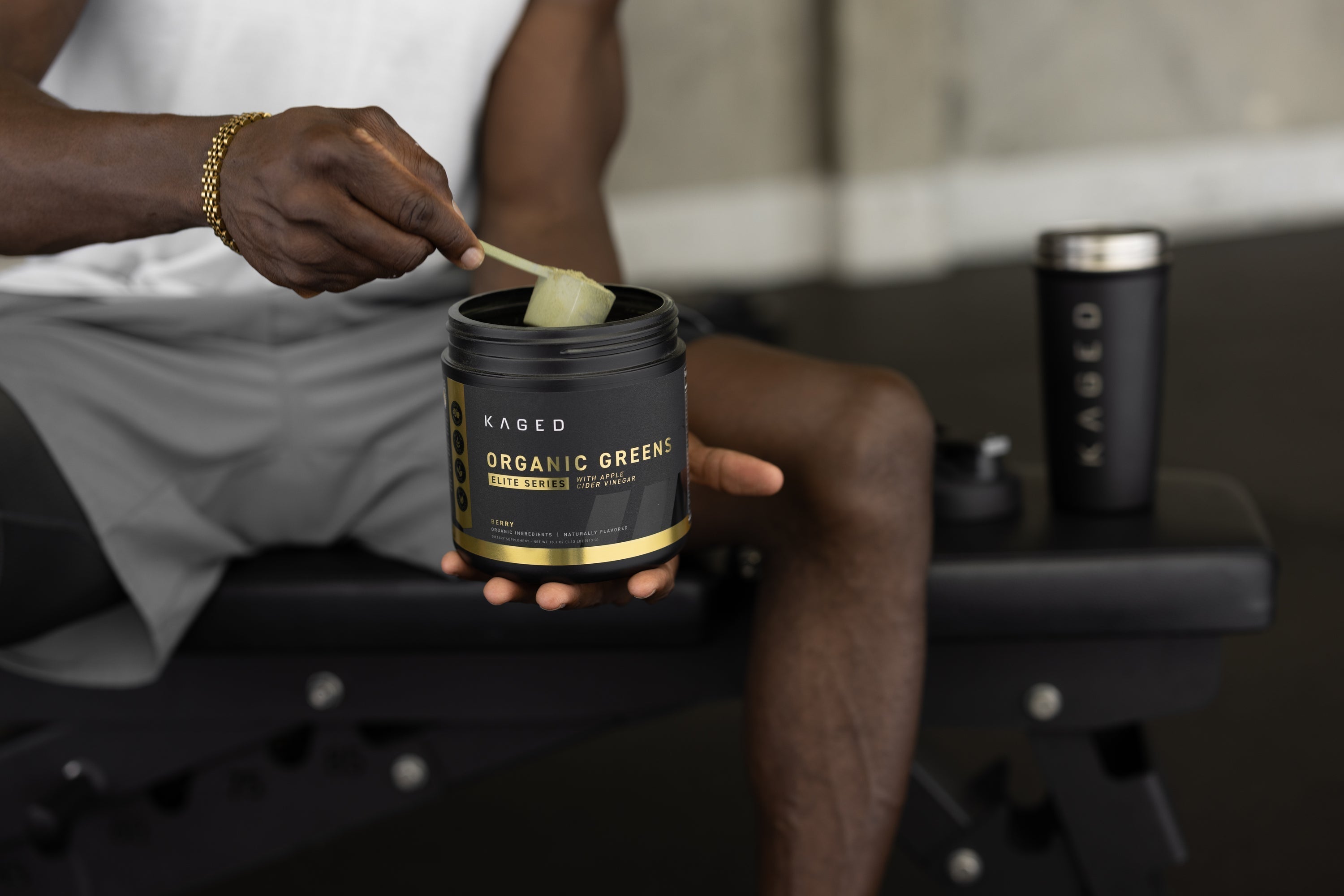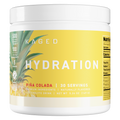
The 3 Best Immune Supplements (That Are Worth It)
Every year as cold season gets closer, we get questions about the best supplements to support your immune system.
Naturally, you may want some kind of “quick fix.” Unfortunately, that doesn’t exist.
Focus on Whole Foods Year-Round
The best way to support your immune system, with or without supplements, is to live a healthy lifestyle year-round.
This means focusing on key pillars like balanced nutrition, regular exercise, and getting enough restorative sleep.
It also includes managing stress, staying hydrated, and prioritizing gut health, as around 70% of your immune system is housed in your gut.
For the nutrition piece, the best way to keep your immune system healthy is to eat an abundance and variety of fruits and vegetables.
You already know this, but we have to repeat it because, again, supplements won’t overcome this or have nearly the impact on your health as whole foods.
If you feel a cold coming on, then it’s too late now to shove down a hundred blueberries or take the latest “immune-boosting” tea and expect it to solve your symptoms.
However, this isn’t the full story either. Some supplements can play a role in providing immune support. Just don’t expect them to work magic.
Based on the research, we believe they are...
- (The right) greens drink
- (The right) multivitamin
- Vitamin D
That's it.
Many “Immune” Supplements Have Flimsy Research (At Best)
The vast majority of supplements you might read about with claims for immune support, frankly, don’t have convincing research.
Here are a few of those cases.
Echinacea. Echinacea is a popular herbal remedy believed to prevent or reduce the severity of colds. However, research on its effectiveness is mixed at best, with most studies failing to show significant immune-boosting benefits.
Zinc. We believe in zinc as a supplement in many cases. In fact, we include L-OptiZinc®, a high-absorption form of zinc, in Kaged Test, our natural supplement for men to support healthy testosterone levels. However, the research on zinc supplementation for cold prevention is not conclusive.
For example, one review study looking at 17 trials found that it may reduce the duration by a day or two, or it may not. It also highlighted that it had adverse effects in some cases.
Elderberry. Elderberry is often marketed as a go-to remedy for colds and flu. While it has some antioxidant properties, the clinical studies on its ability to reduce the duration or severity of symptoms are limited and far from definitive.
Garlic supplements. Garlic is often recommended for immune support due to its antibacterial properties, but most studies that support these claims involve raw garlic, not supplements, and the results are too inconsistent to rely on.
With that said, garlic is a wonderful bulb to include in your diet. You just don’t need to supplement with it.
The Best Supplements for Immune Support: Whole-Food Sourced Fruits, Vegetables, Vitamins, and Minerals
Okay, now let’s get into the supplements that can provide immune support. But again, these support the foundation you should build from your diet.
The theme here is that they’re not synthetic pills or fads. They’re actually the supplements that most closely resemble whole foods (because they often are.)
1) A Greens Drink… But Only If It Has These Qualities
A high-quality greens drink can be an excellent way to boost your intake of fruits, vegetables, and key nutrients, especially when life gets busy and it’s hard to hit your daily servings. But not all greens drinks are created equal.

The ideal greens drink for immune support should contain whole fruits and vegetables. It's a bonus if it also includes whole-food-sourced vitamins and minerals.
Whole-food ingredients provide a range of nutrients that are often lost in synthetic or overly processed forms.
Most greens drinks are underdosed and don’t deliver the nutrients you need.
Many brands rely on proprietary blends, which makes it hard to know exactly what you're getting. As we discussed in our article on how to spot proprietary blends, they allow companies to hide dosages, which means you’re often not getting enough of the key ingredients that actually make a difference.
If they add vitamins and minerals (and many don’t), they often use synthetic forms with questionable absorption.
Choosing whole-food sourced vitamins and minerals can support bioavailability, especially when combined with prebiotic fibers, which is exactly the case with Kaged Organic Greens Elite.
This greens drink contains full doses of 26 organic fruits, vegetables, and herbals, along with 50% of your daily value of 21 whole-food sourced vitamins and minerals, which can provide much-needed immune support and help you cover your nutritional bases.

One scoop of Organic Greens Elite provides the equivalent of 2.5 servings of fruits and vegetables.*
2) A Whole-Food Sourced Multivitamin
In today’s world, even with a diet rich in fruits and vegetables, it can be hard to get all the essential nutrients your body needs.
Modern farming practices have left our soils nutrient-deficient, meaning the produce we eat today may not be as vitamin-packed as it once was.
That means, even if you get ample fruits and vegetables, you still may lack all the essential vitamins and minerals.
That’s where a high-quality, whole-food-sourced multivitamin comes into play.
Most multivitamins on the market are filled with synthetic forms of vitamins and minerals that your body struggles to absorb efficiently. Kaged Multivitamin takes a different approach.
Sourced from real, organic fruits and vegetables, it provides bioavailable nutrients that your body can actually absorb and utilize.
Kaged Multivitamin provides 100% of the recommended daily value of 21 essential vitamins and minerals.
On top of that, Kaged Multivitamin includes Activaloe®, a premium aloe vera extract known for its prebiotic fiber content, which supports gut health and delivers beneficial polysaccharides that support the absorption of the vitamins and minerals.*

3) Vitamin D: The Sunshine Vitamin
Vitamin D, often referred to as the “sunshine vitamin,” is essential for a well-functioning immune system. While it’s commonly known for supporting bone health by aiding calcium absorption, vitamin D also plays a critical role in regulating immune function.
Many people are deficient in vitamin D, particularly those who live in areas with limited sunlight or who spend most of their time indoors.
While certain foods like fatty fish, fortified dairy products, and egg yolks contain vitamin D, it's tough to get enough from diet alone, especially if your sun exposure is minimal.
First, Check Your Other Supplements
With that said, you don’t need to just grab a vitamin D supplement.
First, check your other supplements. If your multivitamins or greens drink already have it, then you’re already supplementing with it.
Second, you may not be deficient if you make a point to get some sunlight. Getting your vitamin D levels checked can be part of a routine blood panel. alk to your healthcare provider about getting your levels tested.
4) Vitamin C: Is It Really Worth Supplementing?
This is a “gray area” one. There’s no doubt that vitamin C is crucial for your immune system.
But vitamin C supplements are a different story. One review study of vitamin C on the prevention and treatment of the common cold showed that supplementation did not decrease the incidence of colds.
Where it was beneficial, it was at about 200mg per day. An orange has about 80mg, so if you have five servings of fruits and vegetables daily, you’ll likely hit that mark.
This research suggests that as long as you eat fruits and vegetables, you’ll hit the optimal mark. With that, for most people, there’s no reason to supplement.
Prioritize a Year-Round Healthy Lifestyle
If you choose to incorporate supplements into your routine, remember that they’re not quick fixes or remedies for symptoms.
They’re most beneficial when you take them as part of your routine, helping to fill nutritional gaps and support your immune system over time. By making these proactive choices, you can set yourself up for long-term wellness and performance.
*These statements have not been evaluated by the FDA. This product is not intended to diagnose, treat, cure, or prevent any disease.





















